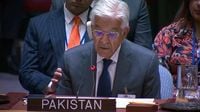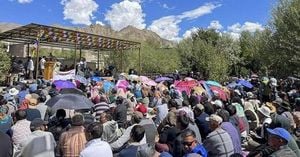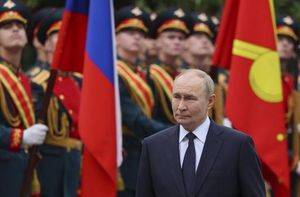Pakistan’s Defence Minister Khawaja Asif found himself at the center of a social media storm after a series of verbal blunders during his speech at the United Nations Security Council’s AI Innovation Dialogue on September 26, 2025. The high-profile session, chaired by UN Secretary-General Antonio Guterres, was intended to address the accelerating impact of Artificial Intelligence (AI) on global security and diplomacy. Instead, Asif’s repeated mispronunciations and slip-ups quickly overshadowed his message, sparking widespread ridicule and debate about Pakistan’s diplomatic posture and the broader stakes of AI in warfare.
According to reporting from Times Now, Hindustan Times, and Dawn News, Asif stumbled at least seven times during his address. He mispronounced words such as “risk” as “riks” and “development” as “developend,” and famously referred to the “breathtaking space” of AI rather than its “breathtaking pace.” At one point, he even fumbled over “first time,” repeatedly saying “sirst time” before correcting himself. The minister also mixed up “six pillars” with “six pip-pillars,” creating further confusion.
These gaffes were not lost on the audience—nor on the internet. A video compilation of his speech, circulated by ANI and other news agencies, quickly went viral. Social media users wasted no time poking fun. One quipped, “Operation Sindoor shook him,” a reference to the recent Indian military operation. Another mocked, “He can’t even speak one sentence properly.” A third, with a Bollywood twist, asked, “Arre kehna kya chahte ho?” (What are you trying to say?). As Hindustan Times observed, the minister’s delivery became a running joke, with some likening his performance to the unpredictable play of Pakistan’s national cricket team.
But behind the viral memes lay a serious message. Asif’s speech was supposed to highlight the risks and challenges posed by AI in modern warfare, particularly in the context of rising India-Pakistan tensions. He warned, albeit with several stumbles, that “AI is reshaping the world at a breathtaking pace,” and that the technology “lowers the threshold of conflict, compresses decision-making, and narrows the scope for diplomacy.” He continued, “In the absence of global normative standards and legal guard rails, the AI revolution risks reinforcing digital divides, entrenching new forms of dependency and imperiling peace.”
Asif drew particular attention to the recent hostilities between India and Pakistan, referencing India’s Operation Sindoor, which was launched on May 7, 2025. According to Times Now, this operation was India’s military response to a terrorist attack in Pahalgam, Kashmir, on April 22, 2025, where 26 tourists were killed. In retaliation, Indian forces targeted terror infrastructure in Pakistan and Pakistan-occupied Kashmir. Asif claimed that, for the “first time,” nuclear-armed states had used autonomous loitering munitions, high-speed cruise missiles, and drones against each other during a military exchange. He argued that these AI-driven weapons could fuel dangerous escalations, warning, “Without international cooperation and ethical standards, AI in warfare risks destabilising already fragile regions.”
The conflict, which saw a rapid escalation of hostilities between two nuclear-armed neighbors, was brought to a halt with a ceasefire announced on May 10, 2025. The use of advanced AI-enabled weaponry on both sides, as highlighted by Asif, has raised alarm bells among security analysts and diplomats alike. The minister’s warning about the potential for AI to compress decision-making timelines and reduce diplomatic options resonated with many, even as his delivery faltered.
Beyond Asif’s speech, the UNSC session tackled a host of other pressing global issues. Delegates discussed a pending vote on delaying the automatic “snapback” of UN sanctions on Iran and extended the peacekeeping mission in Lebanon (UNIFIL) until 2026. The council also addressed ongoing conflicts in Ukraine and South Sudan, as well as rising tensions in Lebanon following an Israeli drone strike. UN Secretary-General Antonio Guterres used the occasion to renew his call for Security Council reforms, emphasizing the need for the body to represent “the world of today, not that of 1945,” and highlighting India as a crucial voice in any future restructured council.
Meanwhile, back in Pakistan, Asif’s diplomatic woes didn’t end with his UN address. Just days earlier, on September 20, 2025, he made headlines for giving conflicting statements about whether Pakistan’s nuclear capabilities would be made available to Saudi Arabia under a new defense agreement. In an interview with Geo TV, Asif initially suggested that “what we have, and the capabilities we possess, will be made available to [Saudi Arabia] according to this agreement.” However, he later backtracked in a separate interview with Reuters, insisting that nuclear weapons were “not on the radar,” as reported by Dawn News. The confusion deepened when Foreign Office spokesman Shafqat Ali Khan avoided a direct answer, only saying that Pakistan’s nuclear doctrine “has evolved and continues to do so.”
All these developments have left observers questioning Pakistan’s diplomatic strategy and coherence on the world stage. The fumbles at the UN have become symbolic of broader communication challenges, especially as the stakes of AI in warfare and nuclear diplomacy rise. Yet, as some analysts point out, the substance of Asif’s warnings should not be dismissed outright. The risks posed by AI-driven weapons, the potential for rapid escalation between nuclear powers, and the need for robust international standards are issues that demand urgent attention—regardless of how they are delivered.
For many, the episode is a reminder of the double-edged nature of modern diplomacy, where every word is scrutinized, and every slip can become global news. As AI continues to reshape the landscape of conflict and cooperation, the world’s diplomats will need to find not just the right words, but the right frameworks to keep the peace.




